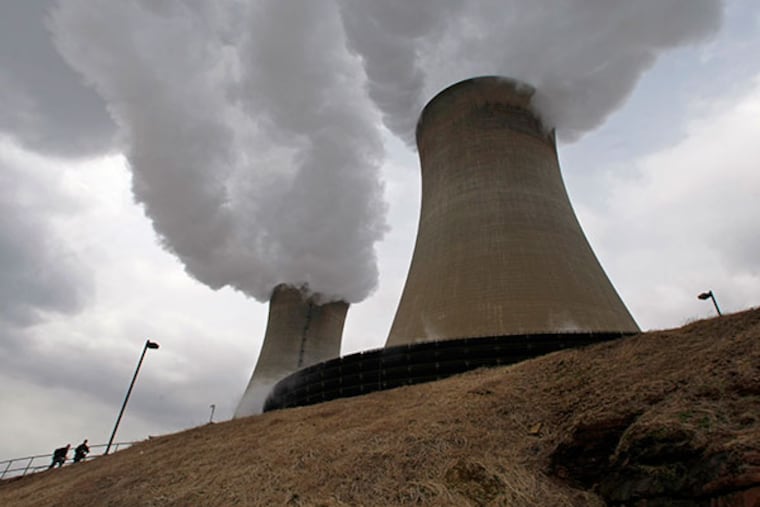Exelon seeks synergies with Pepco deal
Exelon Corp., the Chicago energy giant that owns Peco Energy Co., announced an expansion effort Wednesday that would create an unbroken chain of urban utilities stretching from Bucks County to Washington, D.C.

Exelon Corp., the Chicago energy giant that owns Peco Energy Co., announced an expansion effort Wednesday that would create an unbroken chain of urban utilities stretching from Bucks County to Washington, D.C.
Exelon agreed to buy Pepco Holdings Inc. for $6.8 billion in cash, absorbing two million customers served by three operating companies: Atlantic City Electric Co. in South Jersey; Delmarva Power and Light in Delaware and Maryland; and Pepco, which serves Washington and its Maryland suburbs.
With the merger, Exelon would become the biggest utility in the mid-Atlantic region and perhaps in the nation, with nearly 10 million electric and gas customers.
"Exelon and Pepco Holdings have a compelling strategic rationale for merging, given our geographic proximity and similar utility business models," said Christopher Crane, Exelon's chief executive.
The merger is the latest consolidation in the utility industry, where sales are stagnating as customers switch to more energy-efficient appliances. Utilities, under pressure from investors to maintain profit margins, can cut overhead by combining operations.
Exelon said the merger will produce net synergies of more than $250 million over the first five years after the deal closes in mid-2015.
The merger will run a gauntlet of regulatory reviews in three states and the District of Columbia. It will also be examined by the U.S. Department of Justice and the Federal Energy Regulatory Commission.
"These are not the easiest jurisdictions to work with," said Paul Patterson, a utility analyst for Glenrock Associates L.L.C. in New York.
Exelon's proposed merger with Public Service Enterprise Group, the parent company of New Jersey's PSE&G utility, ran aground in 2006 after it was stymied by state regulators.
Exelon attempted a hostile takeover in 2009 for NRG Energy that failed to win support from shareholders.
But in 2012, Exelon persuaded Maryland regulators to approve a $7.9 billion merger with Constellation Energy Group Inc., which operates Baltimore Gas and Electric Co. BG&E is nearly the same size as Peco, which serves 2.1 million electric and gas customers in Philadelphia and surrounding suburbs.
"We learned a lot from some things that worked and some things that haven't worked in the past," Crane told analysts Wednesday in a conference call.
"The regulators have a tough job to do and they have to prove this is in the best interest of the consumer, but we believe we have prepared a package that shows that by the commitments we're making," he said.
Exelon will offer $100 million in benefits, amounting to $50 per customer, that state regulators can decide to apply as they wish - toward energy efficiency programs, low-income customer support, or direct customer rebates.
The company also pledged to maintain current philanthropic programs and corporate headquarters in Mays Landing, N.J., Newark, Del., and Washington.
Exelon is offering $27.25 a share for Pepco. The price represents a 25 percent premium to Pepco's closing price on April 25, before speculation began that Pepco was for sale.
Pepco does not own any power plants - like many utilities in the deregulated age, it divested its generation assets and makes money strictly from the distribution companies, whose rates are set by state regulators.
For Exelon, which operates the nation's largest fleet of nuclear reactors, the Pepco acquisition represents a shift toward owning utilities, which have generated more reliable profits in recent years than power plants, which have struggled in a competitive climate in which wholesale energy prices are depressed.
Crane, in an interview, said that despite the growth of its utility investments, Exelon remains committed to the power generation business. Utilities will comprise 60 percent to 65 percent of its business after the merger.
"This is not a signal that we're leaving the competitive market behind," he said.
One benefit that Exelon sees for existing customers from the merger is greater resources upon which the utilities can draw to respond to storms, which have caused devastating outages for Peco in recent years.
"There's a real benefit to the scale and to the emergency-response capabilities as we're starting to see a significant weather shift and storms in the last couple of years," said Crane.
Exelon was formed in 2000 with the merger of Peco and Unicom, the parent company of Commonwealth Edison in Chicago.
215-854-2947 @maykuth